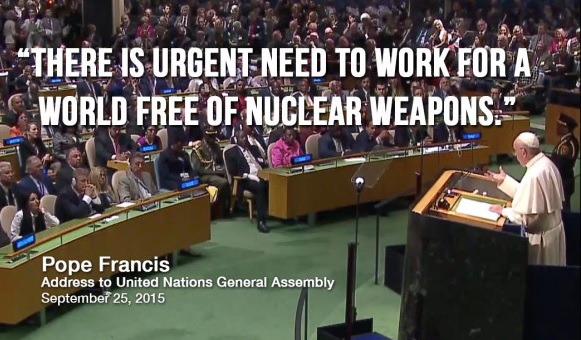
Proposal for a UN General Assembly Resolution
On the Threat of Nuclear Weapons
Abolition 2000 Nuclear Risk Reduction Working Group, Basel Peace Office, Global Security Institute, Human Survival Project, People for Nuclear Disarmament, World Future Council, Zona Libre
Introduction
Any use of nuclear weapons, arising from the Ukraine conflict, or from any other conflict, would create catastrophic humanitarian, economic, military and political consequences.
A primary concern of the UN General Assembly (UNGA) should be to prevent such a catastrophe from occurring. A UNGA resolution addressing the increased nuclear risks arising from the Ukraine conflict could play an important role.
On March 2, 2022, the UNGA, in response to Russia’s illegal invasion of Ukraine, adopted UNGA Resolution ES-11/1, entitled Aggression against Ukraine, which condemned the invasion as a violation of international law — in particular the UN Charter — and demanded that ‘the Russian Federation immediately, completely and unconditionally withdraw all of its military forces from the territory of Ukraine within its internationally recognized borders.’ Amongst other things, the resolution also condemned ‘the decision of the Russian Federation to increase the readiness of its nuclear forces.’
To date, neither the UNGA resolution, nor other international action condemning the invasion, have led to Russia withdrawing from Ukraine, nor to standing down its nuclear forces. On the contrary, the war against Ukraine continues, and the Russian Federation has demonstrated, through political statements and public tests of nuclear capable missiles, its readiness to use nuclear weapons.
These actions not only increase the risk of nuclear war, they undermine the global legal order preventing war and the global non-proliferation regime. Indeed, Ukraine relinquished the nuclear weapons stationed on its territory following the collapse of the Soviet Union, and joined the Nuclear Non-proliferation Treaty (NPT) as a non-nuclear State, based on security assurances in the Budapest Memorandum that their territorial integrity would be respected by Russia (as well as the United Kingdom and the United States).
Related security assurances given by China, France, Russia, the UK and the USA to states parties to the NPT in 1995 were essential in securing their agreement to indefinite extension of the NPT. The erosion of confidence in such security assurances, arising from Russia’s violation of the Budapest memorandum, could have dire repercussions on nuclear non-proliferation.
Finally, it is generally held that even a so – called ‘limited’ use of nuclear weapons, such as the use of tactical nuclear warheads (say from Iskander missiles) on purely military targets would be highly likely to escalate into uncontrolled global thermonuclear war.

Elements of a UNGA Resolution
Below are some suggestions of elements that could be included in such a UNGA resolution. A model resolution based on these elements is also available upon request.
- Reaffirm the obligation of all States under Article 2 of the Charter to refrain in their international relations from the threat or use of force against the territorial integrity or political independence of any State, or in any other manner inconsistent with the purposes of the United Nations, and to settle their international disputes by peaceful means;
• Affirm that a nuclear war cannot be won and must never be fought;
Affirm that the threat or use of nuclear weapons is generally illegal under international law applicable in armed conflict, as confirmed by the International Court of Justice in 1996, and is a violation of human rights law applicable at all times, as confirmed by the UN Human Rights Committee in 2018;
• Call on all states to reaffirm specific security assurances that have been made respecting the territorial integrity of states, such as the Budapest Memorandum;
• Call on all nuclear weapons states to respect, and to make legally binding, assurances not to threaten or use nuclear weapons against non-nuclear states;
• Call on nuclear weapons states to reduce the risks of nuclear war globally, and in the Ukraine conflict in particular, by: o Refraining from policy decisions and political statements threatening the use of nuclear weapons in current conflicts;
• Refraining from nuclear missile tests and military exercises involving potential use of nuclear weapons;
• Adopting policies of no-first-use of nuclear weapons and/or policies that limit the threat or use of nuclear weapons only to deterring or responding to the use of nuclear weapons in ways that threaten the very survival of the state;
• Refraining from further development and deployment of nuclear weapons.
• Reaffirm obligations under the NPT and customary international law to pursue, and bring to a conclusion, negotiations on the prohibition and elimination of nuclear weapons under strict and effective international control.

Further Information on
Nuclear Risks and Consequences
Further political analysis and background on nuclear risks and consequences is available on the webpage of the Abolition 2000 Working Group on Nuclear Risk reduction, and at devastating consequences of nuclear war and escalation scenarios from tactical (European theatre) nuclear war to strategic (global) nuclear war.
Contacts:
• Alyn Ware: alyn@lcnp.org. Mobile +41 788 912 156. WhatsApp +420 773 638 867
• John Hallam: johnhallam2011@yahoo.com.au. Phone +61-411-854-612
• Jonathan Granoff: granoff@gsinstitute.org
• Aaron Tovish: aaron.tovish@gmail.com
• Marc Finaud: mfinaud@hotmail.com